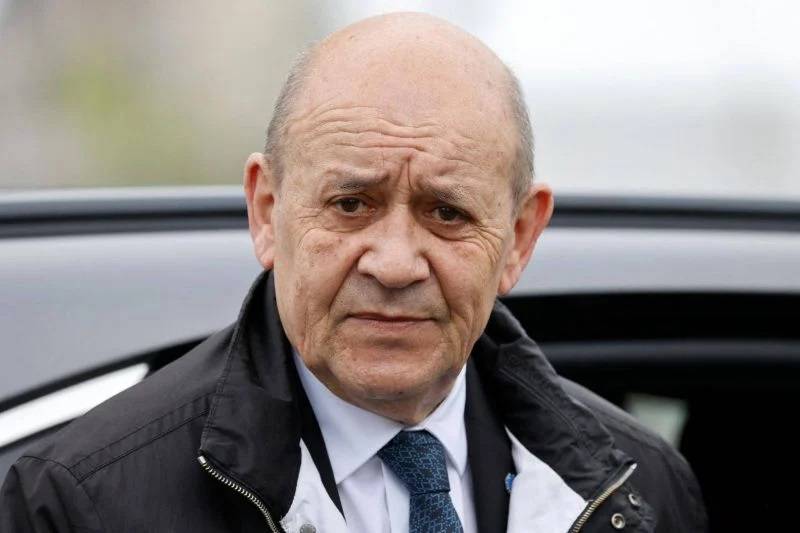
Former French Minister of Europe and Foreign Affairs, Jean-Yves Le Drian, in Paris, May 8, 2022. (Credit: AFP archive photo/Pool/Ludovic Marin)
BEIRUT — President Emmanuel Macron's new "special envoy" for Lebanon, former French Foreign Minister Jean-Yves Le Drian, is due to visit Beirut "next week," caretaker Foreign Minister Abdallah Bou Habib announced Monday.
The announcement came after a meeting between Bou Habib and France's ambassador to Lebanon, Anne Grillo, the state-run National News Agency reported.
In a chat with journalists, Bou Habib added that he was informed by Grillo that "the visit of the French envoy, Minister Jean-Yves Le Drian, will soon take place, but after the presidential election session on Wednesday."
"We welcome him, especially since he is a veteran diplomat, and we wish him success in his mission," Bou Habib added.
A source at the French embassy confirmed to L'Orient-Le Jour Le Drian's forthcoming visit, without giving a specific date.
Last Wednesday, Macron appointed Jean-Yves Le Drian "personal envoy for Lebanon," to "facilitate a consensual and effective" solution to the country's political impasse.
Le Drian, who has solid experience in "crisis management," "plans to go to Lebanon very quickly," an adviser to the head of state told AFP, adding that Macron asked him "to report quickly on the situation," with "proposals for action."
"The situation remains difficult in Lebanon," with the need to "overcome both the political crisis and the economic and financial difficulties," the advisor reportedly said.
At the head of French diplomacy from 2017 to 2022 during the first Macron quinquennium, Le Drian, 75, was heavily involved in the Lebanese dossier, particularly after the Beirut port explosion in 2020.
Le Drian, who served as François Hollande's Minister of Defense in 2012-2017 before becoming Macron's most trusted advisor at the French Ministry of Foreign Affairs, had taken a step back from the world of politics since the last presidential election. His name had been floated for the head of the Institut du Monde Arabe in Paris, whose current president, 83-year-old Jack Lang, is hoping to win another term.
UNIFIL mandate
During their Monday meeting, Bou Habib and Grillo also discussed the mandate of the United Nations Interim Force in Lebanon (UNIFIL).
"We demanded the removal of the paragraph, included in the decision to renew [UNIFIL's mission] last year, regarding expanding its movement in the south," Bou Habib said. "And we informed it of the army's readiness to look over UNIFIL's movements, and we wished it to secure fuel for the army to keep pace with the [UNIFIL's] work."
UNIFIL, which currently numbers just over 10,000 peacekeepers, was established in 1978 by the UN Security Council to ensure the withdrawal of Israeli troops from southern Lebanon. After the summer 2006 war between Israel and Hezbollah, UNIFIL was responsible for monitoring the cessation of hostilities and the application of Resolution 1701. Its mandate is renewed each year, after approval by the Lebanese authorities and a vote by the Security Council.
After the latest renewal of its mandate in August, UNIFIL had to push back against "misinformation" following reports that an amended mandate had granted the force greater freedom of movement in the South.
UNIFIL clarified that it continues to coordinate its movements with the Lebanese Army, even when not physically accompanied by the military.
At the time of the renewed mandate, the UN Security Council reiterated that peacekeepers "do not need any prior authorization or permission to carry out the tasks" for which they are mandated and that UNIFIL can conduct its operations independently."
These clarifications followed incidents with residents of border villages in an area predominantly governed by Hezbollah.
"Ambassador Grillo also informed me of the possibility of her leaving Lebanon next August, to assume her duties as the Director of Middle East Affairs at the French Ministry of Foreign Affairs, provided that the French ambassador to Ankara, Hervé Magro, will move to Beirut to assume his diplomatic duties as French ambassador to Lebanon," Bou Habib added.